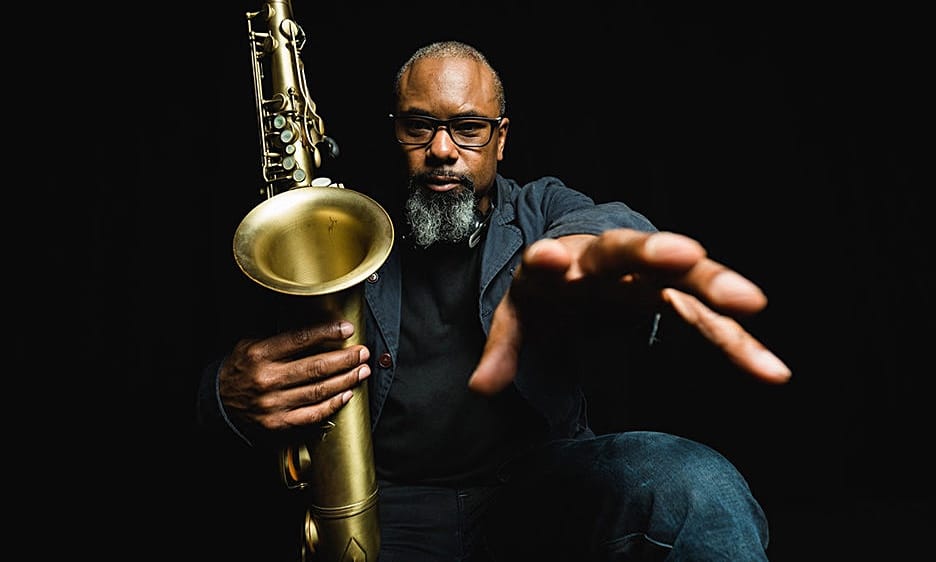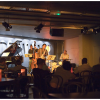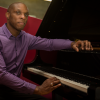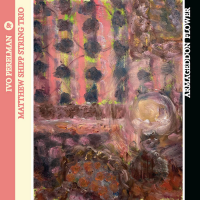Home » Jazz Articles » Interview » Denys Baptiste: Pathfinder For The New London Jazz
Denys Baptiste: Pathfinder For The New London Jazz

I wanted to make an album that expressed ideas about being a black man living in England. The evolution of jazz has always been about including heritage and life experiences. Sometimes in the past in Britain weЎҜve just copied what the Americans do so well. But thereЎҜs a strong identity to the music thatЎҜs coming from here now.
—Denys Baptiste
Denys Baptiste
saxophoneb.1969

Jason Yarde
saxophone, alto
Soweto Kinch
saxophone
Steve Williamson
saxophoneb.1964

Courtney Pine
saxophoneb.1964

Byron Wallen
trumpetb.1969
Baptiste's generation in turn owes a debt to scene-godparents bassist

Gary Crosby
bass, acousticb.1955

Shabaka Hutchings
woodwinds
Camilla George
saxophone
Binker Golding
saxophone, tenor
Moses Boyd
drums
Nubya Garcia
saxophone
Theon Cross
tuba
Cassie Kinoshi
saxophoneb.1993
In 2020, Baptiste is working on ideas for his sixth album. He debuted with Be Where You Are in 1999 and followed up with Alternating Currents (2001), Let Freedom Ring! (2003), Identity By Subtraction (2011)—all on Dune—and The Late Trane (Edition, 2017), an exploration of

John Coltrane
saxophone1926 - 1967
The Late Trane was made with keyboard player

Nikki Yeoh
piano
Neil Charles
bass, acoustic
Rod Youngs
drumsIn this interview, Baptiste talks about his route into jazz and what the music means to him, how it can document the past and confront the present, and how it can accelerate progress towards a brighter future.
All About Jazz: How did you discover jazz and why did you choose the saxophone as your instrument?
Denys Baptiste: The saxophone came first for me and then the jazz. Back in the late 1970s there were all these funk bands with horn sections which I'd see on TV and I fell in love with the shape of the saxophone, the way it looked. I was probably eight or nine years old. I used to cut pictures of saxophones out of magazines and dream about how one day I might actually have one. I was fourteen before that actually happened. An opening came up for a tenor player in my school orchestra. Every year you had to put your name down on a list and say what instrument you wanted to play. And every year I'd put down saxophone but they'd give me a clarinet. I hated it because it wasn't a saxophone. Then one year they said, yeah, there's an opening for a tenor saxophone. I remember putting it together with the help of my teacher and it just being the best day of my life.
I'd got into jazz by then. At home every Sunday we used to listen to Alex Pascall's show "Black Londoners" on BBC Radio London. He mainly played West Indian music, which is my family's background, but the theme song was

Sonny Rollins
saxophoneb.1930
After getting into "Don't Stop The Carnival" I began rifling through my Dad's record collection. There was a lot of reggae and soca but I found he had an interest in jazz that he'd never told me about. There were two records that I absolutely totally wore out. One was

Dave Brubeck
piano1920 - 2012

Count Basie
piano1904 - 1984

Paul Desmond
saxophone, alto1924 - 1977
AAJ: Were there any other key records?
DB: Later there was Courtney Pine's Journey To The Urge Within. He was another massive influence. Just seeing someone who was like me, only a few years older, a really cool looking guy in a suit. And

Herbie Hancock
pianob.1940
AAJ: What was the next significant step in your development?
DB: I started going to a workshop that

Tim Whitehead
b.1950
Joe Zawinul
keyboards1932 - 2007
I was studying mechanical engineering at college at the time. I did that from when I was 16 until I was about 20 because I thought there was no way I could become a professional jazz musician. I carried on going to the workshops though because jazz was still really important to me. One day I went to a jam session at the Watermans Arts Centre in Brentford, West London. And the pianist,
Brian Edwards
drumsSo one Saturday I got a phone call from Gary at my house, which totally blew my mind. He invited me to come along and sit in at the jam sessions they held on Saturday afternoons at the Jazz CafЁҰ. This was about 1990, 1991. That was the scene for all the young players at time. And we'd sometimes get big-name musicians coming along who were playing at Ronnie Scott's. We had

Steve Coleman
saxophone, altob.1956

Billy Higgins
drums1936 - 2001

Tony Kofi
saxophone, tenorb.1966

Trevor Watkis
keyboards
Jean Toussaint
saxophoneb.1957
AAJ: Please talk a bit more about the importance of including a message in your music, about having that extra dimension beyond the notes. An early example of you doing that would be "Stop And Look Around" on Alternating Currents.
DB: I wrote that with [vocalist] " data-original-title="" title="">Juliet Roberts. It was around the time Damilola Taylor was murdered. Things came together for me. All the ideas that I'd read in Frank Kofsky's book [Black Nationalism And The Revolution In Music] when I was in college, and listening to things like A Love Supreme and Sonny's Freedom Suite and the Mingus albums. That music had an added dimension for me, because it was written out of a feeling, out of an urgency, a need to express something that these musicians felt was wrong with the world. You can feel the energy in the room. They're not just playing clever tunes.
AAJ: Your next album, Let Freedom Ring!, took that forward.
DB: I wanted to do a project that told the history of the music and touched on those albums that were important to me from an emotional standpoint. I wanted find a music that made a comment on the world. Like, where am I within all this? I wanted to make an album that expressed some of those ideas about being a black man living in England in the 1990s and experiencing the things that I have experienced.
For me, music has to have function. Pop music can quite often be... just stuff. For me, jazz was born out of people needing to express themselves from whatever point they happened to be in their life. Perhaps they're experiencing racism and they need to express what they feel about it. That's the strength of Freedom Suite or Coltrane's "Alabama" or

Jackie McLean
saxophone, alto1932 - 2006
AAJ: It is an outstanding album. Why did we have to wait seven years for Identity By Subtraction?
DB: You see, I'm not massively prolific. I kind of wish I was a bit more so. But I'm more, when I've got something to say I say it and not before. I don't like to do an album just for the sake of doing an album. That's not great for people who want to listen to my music, but I prefer to do things that I feel are of good quality and mean something. Rather than just churn something out and sell some units.
AAJ: How did you arrive at the theme for Identity By Subtraction?
DB: It was during a period when I was trying to define who I was. The title is slightly cryptic. What I meant was discovering the core of who you are as a human being by peeling back the extraneous layers. Taking away all of the things that you project into the world in order to fit into society. Then you are left with, who am I and where am I going with my music and how do I present myself in the world? For me, it comes down to being someone of Caribbean descent, born and living in the UK but having empathy with the people and the musicians around the world who share my heritage. The album was about how you come to terms with that and how you deal with the world.
AAJ: A decade later, in 2020, the same concerns are shaping the new London jazz.
DB: The evolution of jazz has always been about including heritage and life experiences. Sometimes in the past in Britain we've just copied what the Americans do so well. But there's a strong identity to the music that's coming from here now. I teach a couple of classes for Tomorrow's Warriors—as Gary says, "each one must teach one"—and it gives me great pride and pleasure to see these young people who are as excited about the music as I was when I first started playing and who have similar motivations. They might have come from a country in Africa or the West Indies or India. There's a lot of influences that they now feel confident to express through the lens of what we call jazz. These musicians are not ashamed of saying, look, this is who I am, this is what I grew up listening to and this is how I want to express it.
Shabaka and all of these guys, they all are really saying, look, this is who I am. They're not trying to be American, they're not trying to copy, because they know that for the music to evolve it has to be connected to a sense of place and time, to your own heritage, your journey as a human being. It goes back to the idea of identity by subtraction. Who are you? What do you want to be? Don't be ashamed of the music you grew up with. You don't have to pretend to be

Dexter Gordon
saxophone, tenor1923 - 1990

Bud Powell
piano1924 - 1966
AAJ: It goes hand in hand with the increased visibility of women musicians.
DB: It does. For me, working with women musicians is not about trying to make a point though. I happen to think that Nikki is one of the most creative keyboards players I've ever worked with. I know that whatever we do, she's got my back and I've got her back. She always inspires me. Same with Juliet. She's just amazing. I don't know how she does what she does. This music is for everybody, not just the testosterone fuelled bands of the past. You've got great bandleaders like

Laura Jurd
trumpetAAJ: Do you have a theme for the follow-up to The Late Trane yet?
DB: I haven't actually got it in the can yet. I'm kind of playing with lots of ideas, trying to find the right one. Edition is on the case about it. I'm a year late at the moment. So I have an obligation to get it sorted. Dave [Stapleton, founder and director of Edition] is a fantastic advocate for the music. The great thing about Dave and Edition is that they're about the artists. I mean, they want to sell units, but they do everything to help us develop our careers. I love Dave. He did a great service to me inviting me on the label and I hope I've done him proud with the success of that record.
Photo of Denys Baptiste by Dave Stapleton.
Tags
Comments
PREVIOUS / NEXT
Support All About Jazz
 All About Jazz has been a pillar of jazz since 1995, championing it as an art form and, more importantly, supporting the musicians who make it. Our enduring commitment has made "AAJ" one of the most culturally important websites of its kind, read by hundreds of thousands of fans, musicians and industry figures every month.
All About Jazz has been a pillar of jazz since 1995, championing it as an art form and, more importantly, supporting the musicians who make it. Our enduring commitment has made "AAJ" one of the most culturally important websites of its kind, read by hundreds of thousands of fans, musicians and industry figures every month.






 Buy Now
Buy Now





















